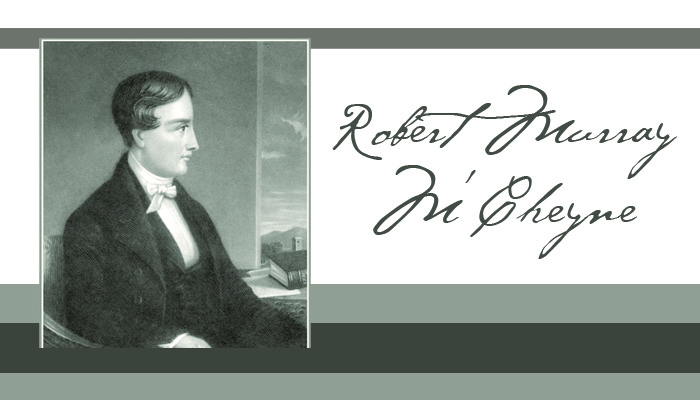
One of my goals for 2017 is to write three hundred words a day on Robert Murray M’Cheyne’s theology and ministry. If I can do that, I’ll have the first draft of my dissertation for The Institution done by November. Every morning I wake up early and, while the house is silent, I find M’Cheyne speaking. He never ceases to stir and shake my ministerial soul.
His Early Joy
This morning I worked on M’Cheyne’s first pastoral post as assistant to John Bonar in Larbert and Dunipace. Larbert was more industrialized, while Dunipace remained somewhat agricultural. The two parishes had more than seven hundred homes, and the spiritual concerns were common to the day. Most shepherding dealt with illness and impending death.
John Bonar was an earnest minister of Christ. He’d regularly visit upwards of thirty homes a day, pressing his people to think of Christ. After visiting Robert, M’Cheyne’s sister said of Bonar, “He seems a very active pushing man—very peculiar, very zealous—quite wrapped up in himself and his parish.” While God honored the preaching Larbert and Dunipace, what’s clear is how the pastor’s visitation work was unusually blessed. Faith became strong; comfort was felt in the last hours of life. The ministers shepherded so well that M’Cheyne told his mother, “There is not a Carroner’s wife takes pain in her head or foot but she has a minister at her door weekly till she gets well.”
I typically assume that preaching God’s word is what most excites every young pastor. After sensing God’s call, and (likely) going through years of training in Bible and theology, every young minister is bursting to herald the gospel. Nothing else energizes a young pastor as ascending to the sacred desk. But M’Cheyne was different. He told his parents he enjoyed the work of visitation more than any other aspect of ministerial life in Larbert and Dunipace.
So much so that he wanted nothing more than to excel at the work.
On the Job Training
M’Cheyne assessed his demeanor during the visits, analyzing how he could have more effortlessly turned the conversation to spiritual matters. One example of such evaluation from his notebook is: “Not simple enough—and yet may some words be carried home” and “spoke plain but not with power.” He even tried different conversational techniques to see which on most ordinarily led to spiritual benefit. Not surprisingly, he found no conversational/spiritual silver bullet.
After several months visiting the people, M’Cheyne wished “the church commissioners would make a trial of a day’s visiting and see how they cast a burden of so many souls on one set of shoulders.”
That wish got my attention.
Examination for Ministry
My theological transition means I’ve given a lot of thought to examinations for ordination. I’m thankful for churches that make ordination mean something. Every pastor should be examined on his knowledge of Bible, theology, church history, sacraments, polity, etc. How else are you to know if he can rightly handle God’s word (2 Tim. 2:15)? Many good brothers have asked me the last few weeks, “What does it matter if you can’t outline the book of Jeremiah? My answer always is, “Why wouldn’t every pastor want to know Jeremiah well enough to outline it on the spot?” Skill with the Word means skill with every part.
I’m also more aware than ever at how insufficient such examination is to test out the full ability needed for faithful ministry. The brightest theological mind may have an astonishing lack of pastoral sensibility. The most skilled exegete may care little for lost souls.
This is where M’Cheyne’s wish comes into play. Is there a better way to assess a potential pastor’s wisdom, compassion, and humility than seeing him in the work of visitation?
I’m not convinced that presbyteries and denominations should add visitation to their examinations. But why wouldn’t every pastoral internship (which should be a prerequisite) aim for regular visitation of members? Think of everything a young man would learn as he observes healthy visitation and engages in it: how to turn conversations to Christ, speak to the hurting, evangelize the lost, exhort the weary, and help the dying. These are the skills of ordinary ministry; these are the skills of love.
Almost every pastor I know would say it’s easier to preach God’s word to hundreds than minister God’s word to one family. But is not the latter what most of our ministry looks like throughout the week?1 So should not our examination process place more emphasis on what is ordinarily the majority of our ministry? Would not our congregations be well served?
————————————————————————–
- I’ll leave aside the matter of most churches today having no visitation/shepherding plan. Thus, many pastors don’t have a house-to-house aspect to their ministry. For that, just read The Shepherd Leader. ↩
